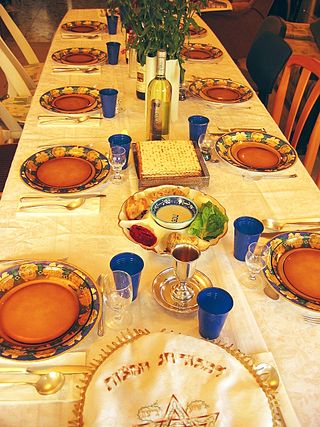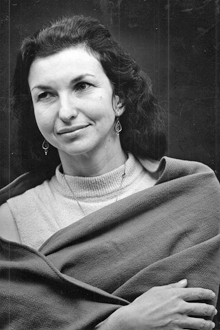Related Research Articles

Passover, also called Pesach, is a major Jewish holiday for Rabbinical Judaism, Karaite Judaism, and Samaritanism, one of the Three Pilgrimage Festivals, that celebrates the Exodus of the Israelites from slavery in Biblical Egypt.

The Passover Seder is a ritual feast at the beginning of the Jewish holiday of Passover. It is conducted throughout the world on the eve of the 15th day of Nisan in the Hebrew calendar. The day falls in late March or in April of the Gregorian calendar; Passover lasts for seven days in Israel and eight days outside Israel. Jews traditionally observe one seder if in Israel and two if in the Jewish diaspora. The Seder is a ritual involving a retelling of the story of the liberation of the Israelites from slavery in ancient Egypt, taken from the Book of Exodus in the Torah. The Seder itself is based on the Biblical verse commanding Jews to retell the story of the Exodus from Egypt: "You shall tell your child on that day, saying, 'It is because of what the LORD did for me when I came out of Egypt.'" At the seder, Jews read the text of the Haggadah, an ancient Tannaitic work. The Haggadah contains the narrative of the Israelite exodus from Egypt, special blessings and rituals, Talmudic commentaries, and Passover songs.

The Haggadah is a Jewish text that sets forth the order of the Passover Seder. According to Jewish practice, reading the Haggadah at the Seder table is a fulfillment of the mitzvah to each Jew to tell their children the story from the Book of Exodus about God bringing the Israelites out of slavery in Egypt, with a strong hand and an outstretched arm.

The Passover Seder plate is a special plate containing symbolic foods eaten or displayed at the Passover Seder. It is used to show all the symbolic foods that are used for the Passover Seder.
Jewish feminism is a movement that seeks to make the religious, legal, and social status of Jewish women equal to that of Jewish men in Judaism. Feminist movements, with varying approaches and successes, have opened up within all major branches of the Jewish religion.

Pesachim, also spelled Pesahim, is the third tractate of Seder Moed of the Mishnah and of the Talmud. The tractate discusses the topics related to the Jewish holiday of Passover, and the Passover sacrifice, both called "Pesach" in Hebrew. The tractate deals with the laws of matza and maror, the prohibitions against owning or consuming chametz (leaven) on the festival, the details of the Paschal lamb that used to be offered at the Temple in Jerusalem, the order of the feast on the first evening of the holiday known as the Passover seder, and the laws of the supplemental "Second Pesach".

Afikoman based on Greek epikomon [ἐπὶ κῶμον] or epikomion [ἐπικώμιον], meaning "that which comes after" or "dessert"), a word originally having the connotation of "refreshments eaten after the meal", is now almost strictly associated with the half-piece of matzo which is broken in two during the early stages of the Passover Seder and set aside to be eaten as a dessert after the meal.
Judith Plaskow is an American theologian, author, and activist known for being the first Jewish feminist theologian. After earning her doctorate at Yale University, she taught at Manhattan College for thirty-two years before becoming a professor emerita. She was one of the creators of the Journal for Feminist Studies in Religion and was its editor for the first ten years. She also helped to create B'not Esh, a Jewish feminist group that heavily inspired her writing, and a feminist section of the American Academy of Religion, an organization of which she was president in 1998.

Letty Cottin Pogrebin is an American author, journalist, lecturer, and social activist. She is a founding editor of Ms. magazine, the author of twelve books, and was an editorial consultant for the TV special Free to Be... You and Me for which she earned an Emmy.

Esther M. Broner, best known as E.M. Broner, was a Jewish American feminist author.
Orthodox Jewish feminism is a movement in Orthodox Judaism which seeks to further the cause of a more egalitarian approach to Jewish practice within the bounds of Jewish Law. The major organizations of this movement is the Jewish Orthodox Feminist Alliance (JOFA) in North America, and Women of the Wall (WOW) and its affiliates in Israel and internationally, known as The International Committee for Women of the Wall (ICWOW). In Israel, the leading Orthodox feminist organization is Kolech, founded by Dr. Chana Kehat. In Australia, there is one Orthodox partnership minyan, Shira Hadasha, in Melbourne.
Abigail Pogrebin is an American writer, journalist, podcast host for Tablet magazine, and former Director of Jewish Outreach for the Michael Bloomberg 2020 presidential campaign.
Lilly Rivlin is an American- Israeli journalist, writer, and filmmaker in the genre of documentary/ political films on women's issues.
Susannah Heschel is an American scholar and professor of Jewish studies at Dartmouth College. The author and editor of numerous books and articles, she is a Guggenheim Fellow Heschel's scholarship focuses on Jewish and Christian interactions in Germany during the nineteenth and twentieth centuries.
Joy Levitt is an American rabbi and from 1987 to 1989 was the first female president of the Reconstructionist Rabbinical Association. Levitt is also the founder of the Jewish Journey Project, an initiative that attempts to replace individual synagogue schools with an elective-driven communal coalition. She and her husband Rabbi Michael Strassfeld are coeditors of the A Night of Questions Passover Haggadah, published by the Reconstructionist Press. She was until December 2021 the CEO of the Marlene Meyerson Jewish Community Center. In addition to the Jewish Journey Project, Levitt has presided over some of the JCC's biggest accomplishments, including the founding of the Adaptations program, the Literacy and Math Tutoring Program, Saturday Morning Community Partners, the Other Israel and ReelAbilities Film Festivals, and oversaw the creation of the JCC's ten Centers of Excellence, including the groundbreaking Wechsler Center for Modern Aging, founded during the COVID-19 pandemic, and the 16 Over 61 Honors in 2021. She also spearheaded advocacy efforts such as the New York response to the ''Save Darfur'' Coalition rally in 2006; the 2021 Save the Climate march to Battery Park; the Upper West Side's response to the 2018 Tree of Life massacre and the January 6, 2021 Capitol Insurrection; the UWS response and starting point for the March for Our Lives ; and organized advocacy for immigration with HIAS following the closing of the US borders to predominantly Muslim countries in early 2017.

Ritualwell is a website that allows users to find, create and share Jewish rituals. It was initially launched in 2001 and was nominated for a Webby Award in the Religion & Spirituality category in 2003. The site was redesigned and relaunched in 2005. It seeks to "increase the number of rituals available for holidays, Shabbat and traditional lifecycle events.

The White House Passover Seder was an annual private dinner held at the White House on the Jewish holiday of Passover during the presidency of Barack Obama. Obama initiated it in 2009 for his family, staff members, friends, and their families. The gathering recited the Passover Haggadah, discussed the themes of the Passover Seder and their relation to current events, and partook of a holiday-themed meal. Obama hosted and attended the Seder each year from 2009 to 2016. It was the first Passover Seder to be conducted by a sitting U.S. president in the White House.
Vanessa L. Ochs is an American scholar of religion at the University of Virginia, an ordained rabbi and an important figure in the fields of Jewish feminism and Jewish ritual. She is a member of the Jewish Studies Program at the university, where she teaches courses in Judaism, the anthropology of religion, and spiritual writing.
Le'Or is a 501(c)(3) organization in Portland, Oregon. It was founded in 2015 by Roy and Claire Kaufmann. The group publishes a haggadah via its website that substitutes cannabis for lettuce in the seder plate and promotes consumption of cannabis as part of the sacred rituals of Pesach (Passover). The haggadah includes the "Ten Plagues of the Drug War" and was meant to inspire discussion about the meaning of bondage in the modern age of mass incarceration and the war on drugs.
Avram Mlotek is an American rabbi, social activist, cantor, writer, actor and slam poet. Mlotek is the co-founder of Base, a pluralistic home-centered outreach program, established in nine cities worldwide, predominantly for Jewish young adults.
References
- ↑ "JCC Manhattan". Jccmanhattan.org. Retrieved 18 April 2016.
- ↑ "Ma'yan". Jwa.org. Retrieved 18 April 2016.
- 1 2 "Feminist Seders Now Their Own Tradition". The New York Times . 16 April 2005. Retrieved 18 April 2016.
- ↑ Cohen, Tamara (2006). הגדת פסח של מעין. ISBN 9780966710748 . Retrieved 18 April 2016.
- ↑ "Enriching Your Women's Communal Seder". Ritualwell.org. 22 August 2010. Retrieved 18 April 2016.
- ↑ "Journey" (PDF). Bcrw.barnard.edu. 2000. Retrieved 2016-04-21.
- ↑ Meredith Bischoff. "The Institute for Welcoming Resources - Progressive Religious Organizations". Welcomingresources.org. Retrieved 18 April 2016.